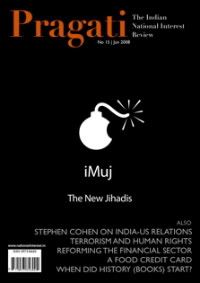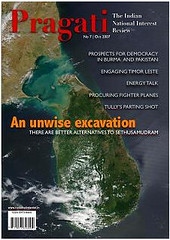
(This article appeared in the June 2009 edition of Pragati)
In January 2009, US network PBS telecast a documentary titled The Story of India. Hosted by Michael Wood,this six-part series narrated a compressed history of India from pre-historic times till Independence. The first episode—Beginnings—-discussed one of the most controversial topics in Indian history: the origin of the Aryans.
In this episode Mr Wood did three things. Standing at Khyber Pass, looking down at the valley of Kabul river, he quoted the translation of a verse from Baudhayana Srautasutra which reads, “some went east..but some stayed at home in the west”. This verse, Wood opined, suggests an Aryan migration from Afghanistan into India.
Second, he went to Turkmenistan to meet Viktor Sarianidi, the legendary Russian archaeologist, who besides unearthing the Bactrian gold in northern Afghanistan, found horses, wheeled vehicles and mud-brick fire altars in Gonur Tepe, Turkmenistan. According to Dr Sarianidi, the Aryans arrived there around 2000 BC and left in 1800 BC towards Afghanistan.
Third, Mr Wood mentioned a 1786 discovery by the polyglot Sir William Jones on the similarities between Sanskrit and various European languages, due to which if a Sanskrit speaker mentioned the word ashva, a Lithuanian farmer would know exactly what he meant. All these indicated that the ancestors of the Aryans were part of a language group which spread from the area between Caspian sea and Aral mountains 4000 years ago. As per this theory, these Sanskrit speaking newcomers subjugated the natives—Dravidians and tribals—and established themselves at the top of the caste hierarchy.
Sounds logical, but Mr Wood’s claims are controvertible. According to B B Lal, who was the Director General of the Archaeological Survey of India, the correct translation of Baudhayana Srautasutra says that while some Aryan tribes went east and the others went west from some intermediary point. This intermediary point for Dr Lal is not the valley of the Kabul river, but that of the Indus.
Continue reading “Op-Ed in Pragati: Getting Objective about it”
Tag: Op-Ed
My Op-Ed in Mail Today: Our Voice

My article, Our Voice in Our History, published in the Aug 2008 edition of Pragati was printed in Mail Today.
Their editor sensationalized the title of the article to, We don’t quite get it, the first globalized civilization was in India which demonstrated that the person who did not quite get it was the copy writer who came with the title. In the article I make no claims that India was the first globalized civilization. The article was not about proving it either but about the need for more voices in Indic studies. As it stands now there is disconnect between the title of the article and contents.
Now, back to the break.
My op-ed in Mail Today: Cultural Liberalism
This was the same piece that was published in Pragati, but enhanced with few hundred words, based on suggestions from Ranjith and Oldtimer. Also thanks to Nitin for first publishing it in Pragati.
Governments usually ban books and movies when they think it has or can upset religious sentiments resulting in a break down in law and order. While that may be the official reason, the ground reality is that it is connected to politics. The Communists became a pot among kettles when they banned Taslima Nasreen’s book Dwikhandito in West Bengal and when Chief Minister Buddhadev Bhattacharya ordered the cancellation of the screening of “Taurus”, a film which showed Lenin in a less admirable light. With all these bans, the governments made it clear that they would rather appease than take an honorable stand.
…
As usual there will be mob violence and selective outrage, but let not the Iranian Ayatollahs and Bangladeshi fundamentalists be our role models. Instead, it is illuminating to read these lines which Justice Sanjay Kishan Kaul wrote in the M.F. Hussain verdict, “A liberal tolerance of a different point of view causes no damage. It means only a greater self restraint. Diversity in expression of views whether in writings, paintings or visual media encourages debate. A debate should never be shut out.”[JPG/PDF]
My Article in Pragati:Towards a cultural liberalism

Governments usually ban books and movies when they think that it has or can upset religious sentiments resulting in a break down in law and order. While that may be the official reason, the ground reality is that it is connected to politics. Thus by banning The Da Vinci Code and The Satanic Verses, the governments made it clear that they can sacrifice liberalism. On finding that James Laine’s Shivaji: Hindu King in Muslim India had remarks that were deemed derogatory to the Maratha hero, the Maharashtra state government banned the book, showing that it is not just minority appeasement at work. Maharashtra’s ban also showed that laws made by local authorities might not be an obvious cure, but opportunities for customised pandering.
Our constitution writers were clear that democracy is meaningless without freedom of speech, and that people should live in a social environment that permits maximum personal and cultural freedom.
Our politicians though, play petty politics with this right. Our governments, independent of their ideology, have indulged in communal and regional politics to satisfy vocal groups. Liberals must oppose such bans and question the judgement behind maintaining such lists
Download Pragati and read the rest.
Epic Problems: My article in Pragati

In an affidavit pertaining to the Sethusamudram project, the Central government told the Supreme Court that there was no historical evidence to establish the existence of Lord Rama or the other characters in Ramayana. The affidavit was filed by the Archaeological Survey of India (ASI), an organization under the Ministry of Culture, whose goal is to conduct archaeological research and protect India’s cultural heritage. This caused an arc of outrage and a political crisis. To control the political damage, the Congress-led United Progressive Alliance (UPA) government withdrew the affidavit and suspended the concerned ASI officials. This makes sense, not so much for shielding the Minister for Culture, but for making unwarranted statements about the historicity of Rama.
Read the rest at the October 2007 (Community Edition) of Pragati.
The Community Edition of Pragati is available for free download and this edition may be freely distributed (in its complete form) via both electronic and non-electronic means. You are encouraged to share your copy with your local community or social networks.